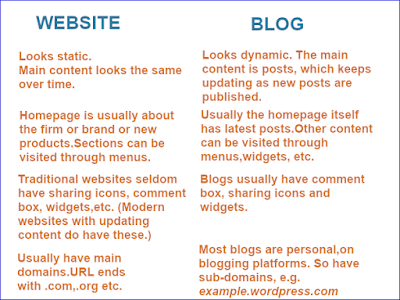Blog versus website
Blog meaning has changed over the years
 |
| Blogs and traditional websites are subsets of the web world |
Technically speaking, blogs are a subset of web spaces or websites. In this assumption, all blogs are websites but not all websites are blogs. Loosely speaking, you can call a website with blogging features as a blog and a blog with lots of static content (that does not refresh) as a website.
Both blogs and other websites have a homepage and a number of other pages. Web designing these days does not require writing each line of code, and a large number of ready-made templates and what-you-see-is-what-you-get [WYSIWYG] programs are available to create any type of website with numerous features. External codes in the form of widgets / gadgets are available that can be fitted into almost any design. Blogging platforms give this functionality through their 'theme' or ‘design’ option. So, the end result of web designing whether doing it through Wordpress / Blogger or ab initio in a web-designing software might look the same.
However, big websites / portals, business sites and websites needing online transactions have structures that blogs cannot [and need not] have. They are much more complex as they deal with huge databases, user-generated queries, payments, high level of security and so on.
Blogs have some distinctive features that websites, especially those maintaining old characteristics of websites, do not possess. If your site has the following features, it is more likely a blog:
Not necessarily, but generally, if a site URL shows that it is part of a blogging platform [e.g. example.blogspot.com], it is a blog. But a blog need not have such an identity [e.g. http://www.indiantopblogs.com]
If a website is maintained in the form of a diary in which posts are written periodically and are arranged reverse-chronologically, it is a blog. If a site allows commenting on posts, it is further into the blog mold. But modern news portals have blog-like structure for news content.
If a website has widgets for current content, aggregation / grouping of content and interaction, it shifts towards being a blog.
If there is a main website with a sub-site that is called blog, the blog must be maintained with the inherent qualities of blogs - log-keeping, updating and interaction.
On the other hand if a website, even on Blogger / Wordpress platform, is maintained with lots of static information but not in the form of periodically published ‘posts’ and not allowing interaction, it is a website not fit to be called a blog.
Interestingly, Wordpress.org is a blogging creation program (technically called CMS or content management system), but over 30% of all modern websites are created using this!
Since most blogs are of personal nature and not always serious about their brand, people may take a blog and its owner less seriously. Another reason for people not taking blogger as seriously as a website-owner could be that most blogs are maintained free on blogging platforms while you need to pay hosting charges, etc to maintain independent websites.
Because of this, websites / blogs with names containing blogspot / wordpress / tumblr/ medium and other blogging ‘surnames’ score poorly as compared to websites and blogs with independent domain names.
Blog vs website in terms of impact
Since most blogs are of personal nature and not always serious about their brand, people may take a blog and its owner less seriously. Another reason for people not taking blogger as seriously as a website-owner could be that most blogs are maintained free on blogging platforms while you need to pay hosting charges, etc to maintain independent websites.
Because of this, websites / blogs with names containing blogspot / wordpress / tumblr/ medium and other blogging ‘surnames’ score poorly as compared to websites and blogs with independent domain names.
Blogs [or websites devoid of blogging features] that are sub-domains of blogging platforms [e.g. example.wordpress.com] are taken less seriously by search engines too. In totality, however, blogs tend to get more search friendly because of their regular updating, comments etc.
But some website owners prefer to call their websites as blogs, as it invites interaction and tells that the site will keep regularly updating the matter. In fact some of the most influential websites today are either true blogs (e.g. Huff Post, ViperChill) or are updated like blogs (many sites of newspapers, magazines and television channels)!
But some website owners prefer to call their websites as blogs, as it invites interaction and tells that the site will keep regularly updating the matter. In fact some of the most influential websites today are either true blogs (e.g. Huff Post, ViperChill) or are updated like blogs (many sites of newspapers, magazines and television channels)!
The last point
If you are a non-corporate blogger, you can do on your blog whatever a normal website can do and much more. Just keep it in the best form.
Do not pay huge sums of money just to keep a vanity website but maintain a blog. It will require less technical knowledge for its maintenance and degradation. If maintaining a personal or hobby blog, go for Blogger or Wordpress – the best available blogging platforms. If you want to maintain a blog that will only have readable content (and you do not want to have a custom design, widgets etc on the blog), Medium is the right choice.
If you are in business, it is advisable to have a full-fledged website and a complementary blog and/or a social media page [e.g. Facebook]. Studies have found that websites with blog sections drive more page indexing on search engines, links and traffic.
 |
| Huffpot blog is a huge portal! |
You might also like to visit this post: How to have a Blogger blog that looks like a static website?



